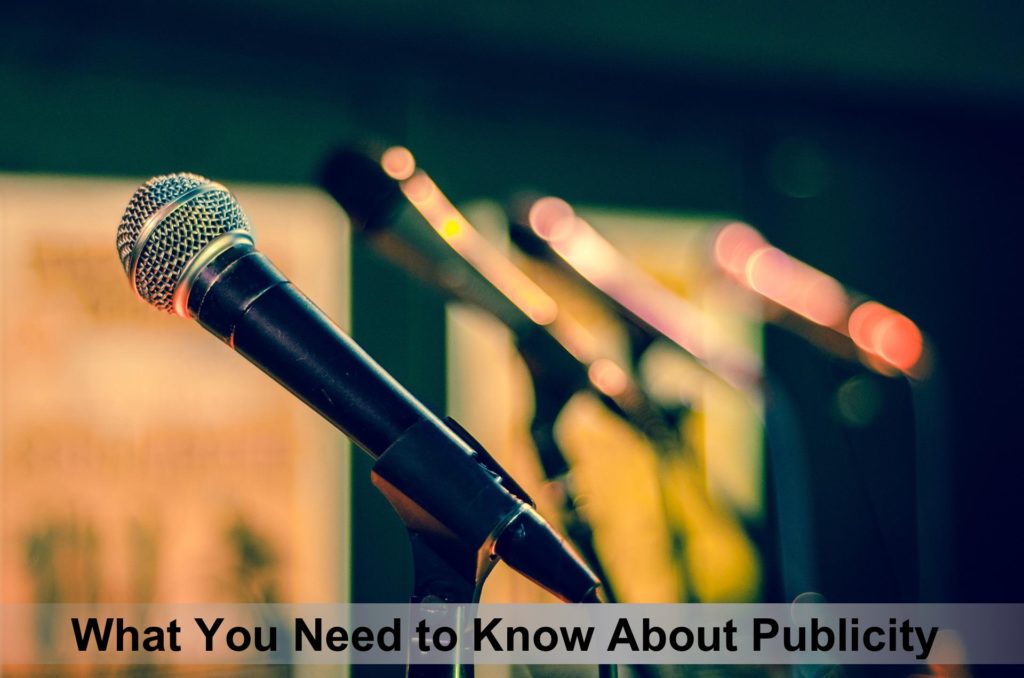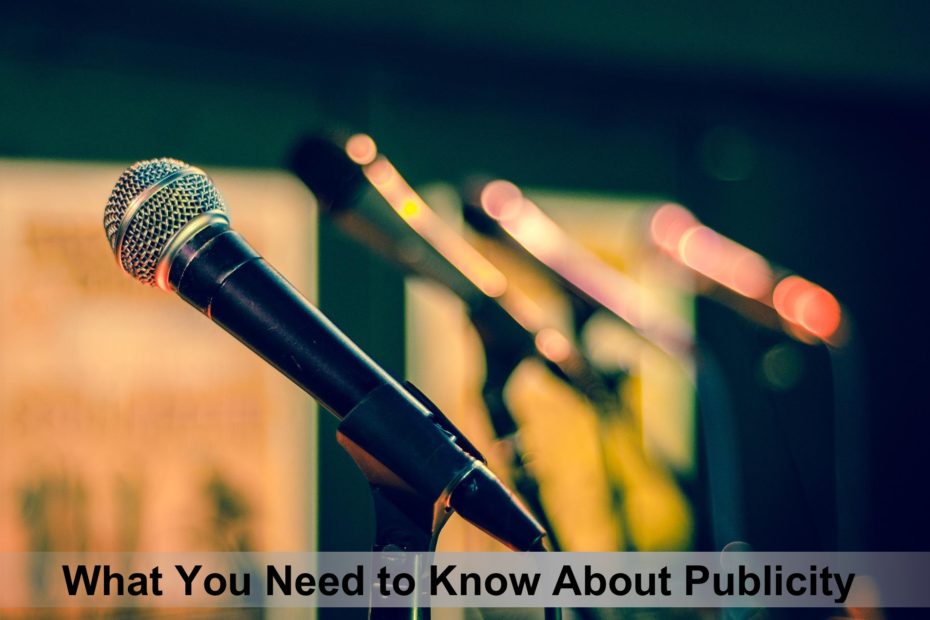
Publicity.
Studios, television companies, and streaming platforms use it to let people know about a new movie or show.
Actors and musicians use it to let people know about their new projects. Non-Profits like Make-A-Wish use it to help fundraise.
And finally, businesses use it to help make people aware of them and their products.
However, not all publicity is equal.
There are times when publicity can make all the difference. There are also times when publicity can be fatal.
Overly dramatic? Maybe but there are certainly some people and companies that would disagree with you.
Today I’m going to talk about what publicity is, why you need it, why it can be a problem, and what should think about before you court it.
What is Publicity?
Publicity is essentially the attention you or your company get through the media.
Many times it’s happening in the form of entertainment such as when you watch Colbert or Jimmy Fallon.
Other times it plays out as news appearing on Fox, CNBC, CNN, or even your local news channel.
You see it in print, on television, and on the internet.
You listen to it in podcasts and watch it on YouTube.
Publicity is happening all around you all the time but the majority of the time it has to be earned.
You might be thinking, what does he mean by earned?
Good question.
It’s earned because you have to persuade the media to run it.
Unless you, your company, or your product are already well known, the media isn’t going to contact you to run a story. It’s going to be the other way around.
Very few companies will have the media reaching out to them asking for access to interview you or somebody on your team about your company.
Think Apple, Google, or Tesla.
They are companies that have the kind of clout and public interest that makes them hot stories simply because it has to do with them.
It’s going to be more of a challenge for you and this is where public relations (PR) comes into play. A PR person will reach out to the media and pitch them to cover a story.
It’s important to understand that you don’t get the final say on whether you receive publicity. It’s the media outlet that makes this call.
It doesn’t matter if it’s a television station, newspaper, magazine, radio program, blog, podcast, or videocast.
The outlet you contact will make a decision on whether it’s something that would be right for their audience.
A tech blog isn’t likely to be interested in a new running shoe your company is releasing unless it has some amazing tech in it. However, a health and fitness site might find it to be an interesting story for its audience.
So now that you better understand what publicity is let’s take it a little deeper.
Why Do You Need Publicity?
There are many reasons why you might want or need publicity.
The value of publicity is it gets the word out.
It could be to create brand awareness.
If I was to drop a name such as Toyota, Disney, Marvel, Apple, or Nike there is an image that you invoke in your mind. You know who they are and what they sell.
They may also make you feel a certain way be it positive or negative.
Chances are, your company isn’t likely to have the kind of brand awareness the before mentioned companies do.
However, this doesn’t mean you can’t have high brand awareness in your industry.
It’s unlikely that somebody in PR wouldn’t know who Cision, Meltwater, or Agility PR solutions is.
In the Search Engine Optimization space, Semrush, Moz, and Ahrefs are well known.
While brand awareness isn’t an endgame it’s certainly an important piece of the puzzle and publicity is a great way to gain this type of awareness.
Another reason you might need publicity is to promote a brand new product.
Trade shows and media events have become key components for getting publicity.
Apple has mastered the art of using media events to get the word out about its new products. Because of Apple’s size and influence on its market, they generate a ton of publicity. Not only do they get covered in industry publications and blogs but they get mainstream coverage as well
This hasn’t been lost on other companies such as Google, Meta, and Microsoft have tried to replicate Apple’s strategy.
Even non-tech companies such as Tesla, Ford, and GM have followed suit.
Actors do publicity tours to promote their new movie or show.
Another type of publicity is sponsorships. Being affiliated with a cause can help shape the perception of who you are and what you believe in.
Boise State had a head football coach who was active within the community. He was a strong supporter of Make-A-Wish. He created a 5k event that raised more than $173,000 for the Boise State general scholarship fund during its lifetime. He also donated money to help with the construction of new buildings for the university.
He had a strong reputation in the community. When took a job at another university it was tough to see him go. He wasn’t just the football coach, who happened to take the program to all new heights, he was a pillar in the community.
His predecessor, who ironically grew up in Boise and was an alum of Boise State, did none of these things. People weren’t as upset when he left for a new job.
Not All Publicity is Good
Legendary showman, P. T. Barnum is reputed to have said, “There is no such thing as bad publicity.”
With all due respect to Mr. Barnum, I strongly disagree.
In his defense, Barnum died in 1891 which was more than a half-century before the Information Age began.
If he lived during this time or even now as we experience the digital age, he might have disagreed as well.
There will be publicity that you won’t want. And, as I said in the introduction, it can lead to big problems that could hurt your company and even cost you your job.
Travis Kalanick, the former CEO of Uber, resigned from the company in 2017 after several years of bad publicity.
Pharma bro, Martin Shkreli, became one of the most hated people in America when he bragged about hiking the cost of HIV-related drug Daraprim by 5,000%. It also brought scrutiny to the pharmaceutical industry.
BP, Mattel, Bank of America, and Volkswagon all found themselves getting bad publicity which caused billions of dollars in losses.
Trevor Bauer’s baseball career is likely over after multiple allegations of sexual assault led Major League Baseball to suspend him for two seasons.
The fact that prosecutors declined to charge him made no difference and his team, the Los Angeles Dodgers, have done their best to distance themselves from him.
The Johnny Depp/Amber Heard story has hurt both of them.
Depp reportedly was dropped from The Secrets of Dumbledore because of Heard’s allegations of abuse.
The allegations also caused Depp to lose another lucrative role. His manager stated that Disney backed out of a $22.5 million deal to reprise his role as Jack Sparrow in the Pirates of the Caribbean franchise.
Heard has found herself under fire as 3.7 million people signed a petition asking Warner Brothers to drop her from the next Aquaman movie. Warner hasn’t commented but rumor has it that her screen time in the new movie has been cut to under ten minutes.
Do I even need to bring up The Slap at The Academy Awards?
I could go on and on but you get the idea.
You might be thinking that many examples are people or companies getting attention for doing bad things and they deserve their fate.
I wouldn’t argue but the simple truth not every person or company who acts badly gets media attention for it. And it is the attention that creates the publicity that shapes the feelings of the public be it good or bad.
If it’s bad, you will pay because bad publicity is not good for you or your business.
Are You Ready for Publicity?
You may need publicity but this doesn’t mean you’re ready for it.
At a minimum, you need to be able to answer two questions:
- Why do you need publicity?
- What message are you trying to convey?
If you’ve taken the time to create a marketing plan, you’ll likely already have the answers to these questions but let’s break it down.
First, why do you need publicity? I gave some examples earlier but they won’t necessarily be the reasons you need publicity.
You need to be thoughtful.
There are really two pieces to this question. The first is identifying why you need publicity. The second is to think about this from your audience’s perspective.
If you’re pitching an idea to the media, they are your audience and you need to understand what they need and in turn what their audience needs.
Too often companies get caught up in the idea that it’s important because they think it’s important.
I hate to break it to you, but what you think doesn’t mean anything to your audience unless you have established a relationship of trust with them.
Second, what is the message you want to convey?
Like the first question, you need to think of this as a two-parter. Why is your audience going to care? How are you going to speak to them in a way that resonates?
This goes back to knowing the audience you are trying to reach. You need to be able to talk to them in a way that makes them feel like you understand them.
In most cases, they will care less about the fact that you have a new product and more about it helps them solve a problem.
If you cant answer these questions, you’re not ready for publicity.
So there you have it. A crash course on publicity.
You should have a better idea what it is, why you need it, the impact of bad publicity, and what questions you should be able to answer before trying to get it.
Have questions or comments? Join the conversation on Twitter.
*Image by Rudy and Peter Skitterians from Pixabay
- Is Your Marketing Connected? - March 6, 2025
- Stop Planning and Start Strategizing - October 24, 2024
- The Importance of Creating a Connection With Your Marketing - June 6, 2024

